初中英语时态总复习系列(1)
初中英语六种时态复习课件(35张PPT)

②while 引导的从句表示“在……期间”,主从句谓语动词所表示的动 作同时ቤተ መጻሕፍቲ ባይዱ生。这时,主从句都用过去进行时。
e.g.:My father was reading the newspaper while my mother was watching TV.当我的妈妈看电视的时候,我的爸爸正在看报纸。
(2)表示普遍真理或客观事实。 e.g.:The sun rises in the east.太阳从东方升起。 (3)在条件状语从句和时间状语从句中,用一般现在时表示将来。 e.g.:If it doesn't rain tomorrow,we will go for a picnic.如果明天不下 雨,我们将去野餐。 (4)在某些以 here,there 开头的句子中用一般现在时表示正在发生的动作。 e.g.:There goes the bell.铃响了。
(3)现在进行时表示将来 表示位置移动的动词 go,come,leave,fly,start,meet,move 等, 可以用现在进行时表示将要发生的事。 e.g.:We are leaving for London.我们就要动身去伦敦了。
(4)一般现在时表示将来 ①表示按规定或时间表预计要发生的动作。 e.g.:Our plane takes off at 8:10.我们的飞机 8:10 起飞。 ②当主句为一般将来时,或含有情态动词,或是祈使句时,在 if,as soon as,until,when 等引导的状语从句中用一般现在时表示将来。 e.g.:I will give him the book as soon as he comes here.他一来这儿, 我就把这本书给他。
(2)表示当前一段时间内的活动或现阶段正在进行的动作。 e.g.:They are picking apples on a farm all the time.他们一直在农场 摘苹果。 (3)与 always,usually 等词连用,表达说话人强烈的感情,如赞扬、不 满、讨厌等。 e.g.:Mary is always thinking of others instead of herself.玛丽总是为 别人着想,而不为自己着想。
江苏中考英语复习之初中英语主要时态系列(一)—— 一般现在时讲解及练习

一、一般现在时有三种形式1. 谓语是be(am/is/are)的一般现在时。
①肯定形式:主语+be+表语(形容词、名词充当表语)。
I am hungry.You are beautiful.He is a doctor.②否定形式:主语+be+not+表语(形容词、名词充当表语)。
I am not hungry.You aren't beautiful.He isn't a doctor.③一般疑问句形式:Be+主语+表语(形容词、名词充当表语)? 肯定回答:Yes,主语+be. 否定回答:No, 主语+ be+not.—Are you hungry?—Yes,I am./No,I'm not.—Is he a doctor?—Yes, he is./No, he isn,t.④特殊疑问句形式:特殊疑问词+Be开头的一般疑问句?—What is he?—He is a doctor.注意:be要随着主语变。
2. 谓语动词是实义动词(及物动词或不及物动词)的一般现在时。
①肯定形式:“主语+及物动词+宾语”或“主语+不及物动词”。
She has a little brother.她有一个弟弟。
The sun rises in the east.太阳从东方升起。
②否定形式:“主语+don't/doesn't+及物动词+宾语”或“主语+don't/doesn't+不及物动词”。
She doesn't have a little brother.她没有弟弟。
I don't eat every morning.我每天早晨都不吃饭。
③一般疑问句形式:“Do/Does+主语+及物动词原形+宾语”或“Do/Does+主语+不及物动词原形”。
肯定回答:Yes,主语+do/does. 否定回答是:No, 主语+ don't/doesn't.—Do you eat every morning?—Yes, I do./No, I don't.—Does she have a little brother?—Yes, she does./No, she doesn't.④特殊疑问句:特殊疑问词+do/does开头的一般疑问句?What do you like?When do you go to school?注意:根据主语确定用do还是does。
中考英语十六种时态 (1)
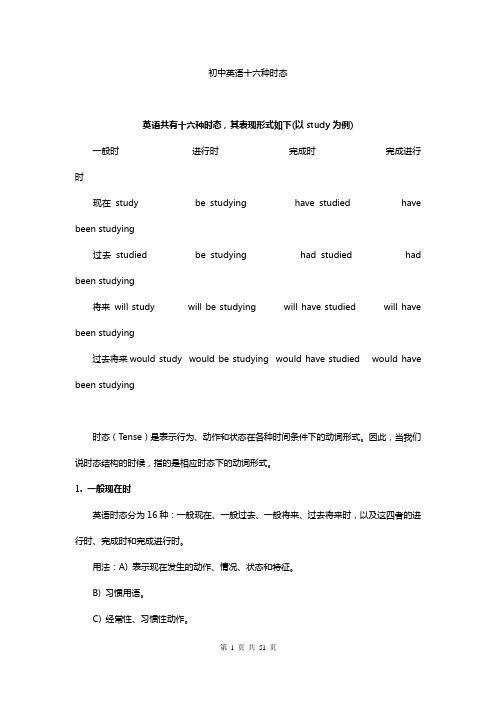
初中英语十六种时态英语共有十六种时态,其表现形式如下(以study为例) 一般时进行时完成时完成进行时现在study be studying have studied have been studying过去studied be studying had studied had been studying将来will study will be studying will have studied will have been studying过去将来would study would be studying would have studied would have been studying时态(Tense)是表示行为、动作和状态在各种时间条件下的动词形式。
因此,当我们说时态结构的时候,指的是相应时态下的动词形式。
1. 一般现在时英语时态分为16种:一般现在、一般过去、一般将来、过去将来时,以及这四者的进行时、完成时和完成进行时。
用法:A) 表示现在发生的动作、情况、状态和特征。
B) 习惯用语。
C) 经常性、习惯性动作。
例:He always helps others. (他总是帮助别人。
)D) 客观事实和普遍真理。
尤其要注意,如果前后文不是一般现在时,则无法保持主句、从句时态一致。
E) 表示一个按规定、计划或安排要发生的动作,(仅限于某些表示“来、去、动、停、开始、结束、继续”等的动词)可以与表示未来时间的状语搭配使用。
常见的用法是:飞机、火车、轮船、汽车等定期定点运行的交通方式。
例:The next train leaves at 3 o'clock this afternoon.(下一趟火车今天下午3点开车。
)How often does this shuttle bus run? (这班车多久一趟?)F) 在时间和条件状语从句里经常用一般现在(有时也用现在完成时)表示将来事情。
一般将来时态知识点详解(初中英语专项复习) (1)
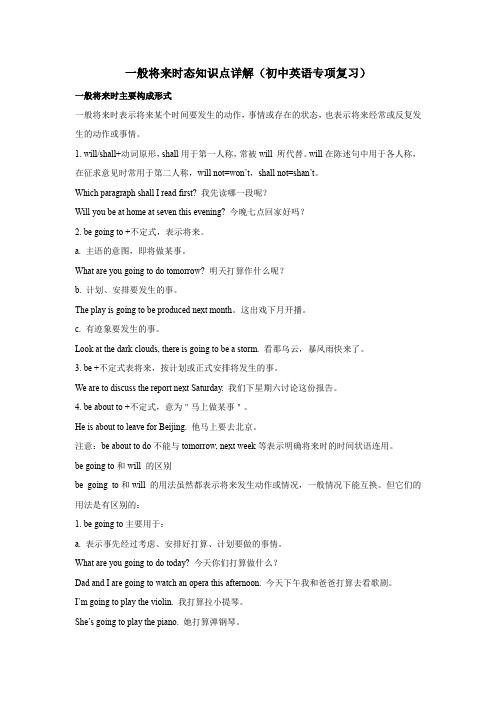
一般将来时态知识点详解(初中英语专项复习)一般将来时主要构成形式一般将来时表示将来某个时间要发生的动作,事情或存在的状态,也表示将来经常或反复发生的动作或事情。
1. will/shall+动词原形,shall用于第一人称,常被will 所代替。
will在陈述句中用于各人称,在征求意见时常用于第二人称,will not=won’t,shall not=shan’t。
Which paragraph shall I read first? 我先读哪一段呢?Will you be at home at seven this evening? 今晚七点回家好吗?2. be going to +不定式,表示将来。
a. 主语的意图,即将做某事。
What are you going to do tomorrow? 明天打算作什么呢?b. 计划、安排要发生的事。
The play is going to be produced next month。
这出戏下月开播。
c. 有迹象要发生的事。
Look at the dark clouds, there is going to be a storm. 看那乌云,暴风雨快来了。
3. be +不定式表将来,按计划或正式安排将发生的事。
We are to discuss the report next Saturday. 我们下星期六讨论这份报告。
4. be about to +不定式,意为"马上做某事"。
He is about to leave for Beijing. 他马上要去北京。
注意:be about to do不能与tomorrow, next week等表示明确将来时的时间状语连用。
be going to和will 的区别be going to和will 的用法虽然都表示将来发生动作或情况,一般情况下能互换。
但它们的用法是有区别的:1. be going to主要用于:a. 表示事先经过考虑、安排好打算、计划要做的事情。
初中英语知识归纳总结——动词的时态

初中英语知识归纳总结——动词的时态动词的时态(一)教学重点一般现在时在英语中,不同时间里以不同方式发生的动作或存在的状态,要用不同的动词形式来表示,动词的这种不同形式称为动词的时态。
时态从时间上划分,可分为四大类:现在时;过去时;将来时;过去将来时。
从行为上,每一类可以分为四种形式:一般式;进行式;完成式;完成进行式。
这样英语的动词合起来,总共有十六种时态,初中只需掌握其中的八种时态。
1、一般现在时(1)一般现在时表示现在的状态、习惯性的动作或主语所具备的性格和能力等。
①当动词是be时,第一人称用am,第二人称用is,其他人称用are.②当动词是实义动词时,一般用动词原形,但如果主语是第三人称单数时,动词必须用第三人称单数形式,其变化规则如下:助动词do(第三人称单数用does)构成否定句、疑问句及答语,但要注意助动词后原来的谓语动词要恢复原形。
例如:I like music.I don’t like music.Do you like music?Yes, I do No, I don’t(2)一般现在时的用法①表示经常、习惯性动作,常和often, usually, every day, sometimes, always 等时间状语连用。
如:He goes to school by bus every day.They often play football②表示能力、职业、特征。
如:Miss Gao teaches English.Do you speak Japanese?③表示客观存在。
如:The earth moves round the sun.Time and tide wait for no man.④表示已经安排好或计划好的事。
如The plane takes off at 7:30.Classes begin at 8:00⑤在时间状语和条件状语从句中,主句用一般将来时,从句用一般现在时。
(完整版)初中英语各种时态练习题集锦
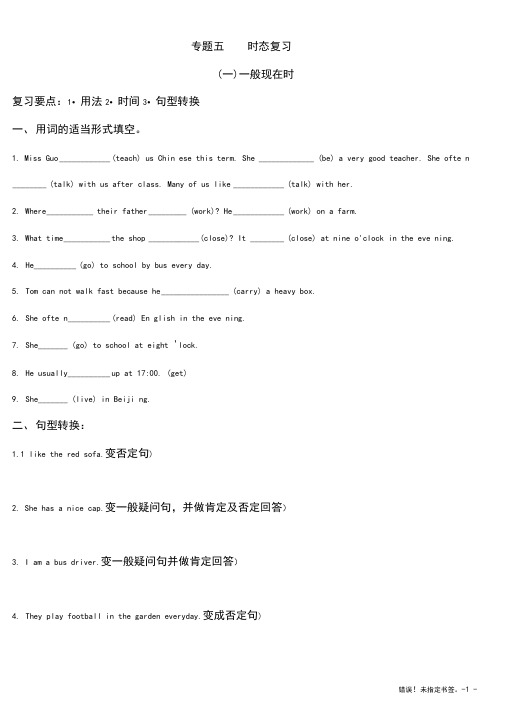
专题五时态复习(一)一般现在时复习要点:1•用法2•时间3•句型转换一、用词的适当形式填空。
1.Miss Guo ____________ (teach) us Chin ese this term. She _____________ (be) a very good teacher. She ofte n ________ (talk) with us after class. Many of us like ____________ (talk) with her.2.Where ___________ their father _________ (work)? He ____________ (work) on a farm.3.What time ___________ the shop ____________ (close)? It ________ (close) at nine o'clock in the eve ning.4.He__________ (go) to school by bus every day.5.Tom can not walk fast because he ________________ (carry) a heavy box.6.She ofte n __________ (read) En glish in the eve ning.7.She_______ (go) to school at eight 'lock.8.He usually __________ up at 17:00. (get)9.She_______ (live) in Beiji ng.二、句型转换:1.1 like the red sofa.变否定句)2. She has a nice cap.变一般疑问句,并做肯定及否定回答)3. I am a bus driver.变一般疑问句并做肯定回答)4.They play football in the garden everyday.变成否定句)5.There is an egg in the basket变成复数形式的句子)(二)一般过去时复习要点:1•用法2•时间3•句型转换一、将下列动词变成过去式。
初中英语八种时态归纳复习(one)

一、一般现在时(一)定义表示经常或习惯性的动作,或存在的状态,还表示主语具备的性格和能力及客观真理。
列:l get up at 6:30 in the morning she is at home (二)构成主要用动词原形表示,当主语是第三人称单数时,在动词词尾加s/es。
(三)句型1、肯定句:主语+谓语+其他。
She reads English everday2、否定句:主语+don’t/doesn’t+谓语+其他。
He doesn’t get up at 6:30 in the morning3、一般疑问句:do/does+主语+V原形+其他?Do you like English? Yes, l do./no,l don’t4、特殊疑问句:特殊疑问词+ do/does+主语+V 原形+其他?What time do you get up every morning?Where does your father work?(四)用法1、表示经常或习惯性的动作,或存在的状态,带与表示频率的时间壮语如:often,sometimes,usually,always,everyday/year,month…)once/twice a week(month,year ect)seldom,on Sundays等连用。
l leave home for school at seven every morning.2、表示客观真理,科学事实、格言警句。
The sun rises in the east.日出东方The earth goes around the sun。
地求饶着太阳转。
3、当主句的谓语动词是一般将来时,那么时间或条件状语从句的谓语动词只能用一般现在时表示将来要发现的动作。
l’ll tell him the news when he comes back.他回来时,我将告诉他这个消息。
4、仅为了描述状态、性质、特征、能力等等。
初中英语四大时态知识点1

一般现在时一, 概念:1)常常性, 习惯性的动作或存在的状态。
标记词或短语(带有表示频率的时间状语): always , everyday , often , once a week (month , year , etc。
) ,never, sometimes , seldom , usually等等She only write to her family once a month.她一个月只给家里写一封。
I go to work by bike every day。
我每天骑自行车上班。
2)表示主语的特征, 性格, 实力, 爱好等。
e.g.He can swim. I work hard. I like watching TV.3)表示客观真理e.g.There are seven days in a week.The sun rises in the east 。
日出东方。
Ten minus two is eight。
十减二等于八。
Light travels faster than sound 。
光的速度比声音的速度快。
The United States lies by the west coast of the Pacific Ocean.美国位于太平洋西岸。
4) 依据英文语法规定, 当主句的谓语动词是一般将来时, 那么时间或条件状语从句的谓语动词只能用一般现在时来表示将来要发生的动作。
主句表将来, 从句要用一般现在时。
例:I'll tell him the news when he comes back.他回来时,我将告知他这个消息。
If you take the job , they will talk with you in greater details。
假如你接受这份工作, 他们将和你谈谈细微环节。
二, 句式结构:1)主语+be动词+其他2)主语+行为动词+其他三, 句式转换1)be 动词的一般现在时的句式转换:确定句 主语 ♌♏表语☎⏹ ♋♎等✆否定句 主语 ♌♏ ⏹☐♦表语一般疑问句: ♏主语 表语回答:✡♏♦ 主语 ♌♏☠☐ 主语 ♌♏ ⏹☐♦特别疑问句 疑问词 ♌♏主语 回答 主语 ♌♏其它2).实义动词的一般现在时的句式转换:①假如主语是I/We/You/They及名词复数, 谓语动词不用做任何变化, 即仍旧用动词原形表示:确定句: 主语+动词原形+其他否定句: 主语+don't+动词原形+其他一般疑问句:Do+主语+动词原形+其他回答: Yes,主语+do./No,主语+don't .特别疑问句: 特别疑问词+do+主语+动词原形+其他②主语是第三人称单数,确定句: 主语+动词的第三人称单数+其他否定句: 主语+doesn't+动词原形+其他一般疑问句: Does+主语+动词原形+其他回答: Yes, 主语+does /No, 主语+doesn't特别疑问句: 特别疑问词+ does+主语+动词原形+其他E.g.Danny is a good student. E.g. Jenny speaks English very well.Danny isn’t a good student.Jenny doesn’t speak English very well.Is Danny a good student Does Jenny speak English very well四, 动词三单变化规律1)一般动词, 在词尾加-s; 如:work -- works live --lives sing – sings2) 以,-s, -x, -sh, -ch结尾的加-es。
初中中考英语知识点总结初中英语主要时态系列(一)—— 一般现在时讲解及练习

一、一般现在时有三种形式1. 谓语是be(am/is/are)的一般现在时。
①肯定形式:主语+be+表语(形容词、名词充当表语)。
I am hungry.You are beautiful.He is a doctor.②否定形式:主语+be+not+表语(形容词、名词充当表语)。
I am not hungry.You aren't beautiful.He isn't a doctor.③一般疑问句形式:Be+主语+表语(形容词、名词充当表语)? 肯定回答:Yes,主语+be. 否定回答:No, 主语+ be+not.—Are you hungry?—Yes,I am./No,I'm not.—Is he a doctor?—Yes, he is./No, he isn,t.④特殊疑问句形式:特殊疑问词+Be开头的一般疑问句?—What is he?—He is a doctor.注意:be要随着主语变。
2. 谓语动词是实义动词(及物动词或不及物动词)的一般现在时。
①肯定形式:“主语+及物动词+宾语”或“主语+不及物动词”。
She has a little brother.她有一个弟弟。
The sun rises in the east.太阳从东方升起。
②否定形式:“主语+don't/doesn't+及物动词+宾语”或“主语+don't/doesn't+不及物动词”。
She doesn't have a little brother.她没有弟弟。
I don't eat every morning.我每天早晨都不吃饭。
③一般疑问句形式:“Do/Does+主语+及物动词原形+宾语”或“Do/Does+主语+不及物动词原形”。
肯定回答:Yes,主语+do/does. 否定回答是:No, 主语+ don't/doesn't.—Do you eat every morning?—Yes, I do./No, I don't.—Does she have a little brother?—Yes, she does./No, she doesn't.④特殊疑问句:特殊疑问词+do/does开头的一般疑问句?What do you like?When do you go to school?注意:根据主语确定用do还是does。
Do_初中英语八种时态归纳复习 (1)(1)
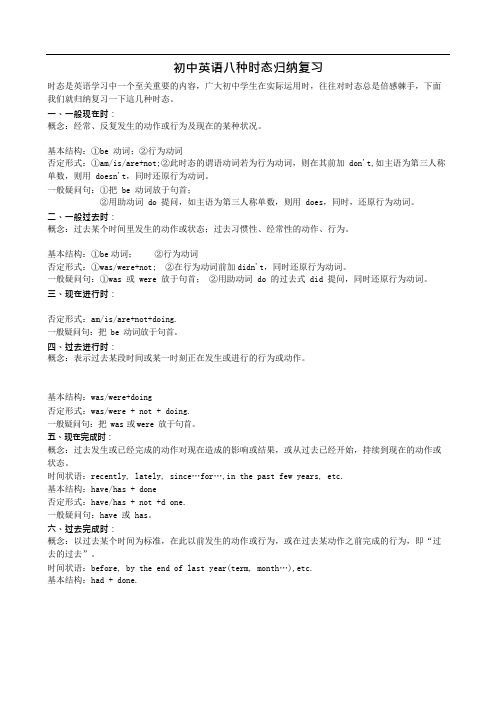
初中英语八种时态归纳复习时态是英语学习中一个至关重要的内容,广大初中学生在实际运用时,往往对时态总是倍感棘手,下面我们就归纳复习一下這几种时态。
一、一般现在时:概念:经常、反复发生的动作或行为及现在的某种状况。
基本结构:①be 动词;②行为动词否定形式:①am/is/are+not;②此时态的谓语动词若为行为动词,则在其前加 don't,如主语为第三人称单数,则用 doesn't,同时还原行为动词。
一般疑问句:①把 be 动词放于句首;②用助动词 do 提问,如主语为第三人称单数,则用 does,同时,还原行为动词。
二、一般过去时:概念:过去某个时间里发生的动作或状态;过去习惯性、经常性的动作、行为。
基本结构:①be 动词;②行为动词否定形式:①was/were+not; ②在行为动词前加didn't,同时还原行为动词。
一般疑问句:①was 或 were 放于句首;②用助动词 do 的过去式 did 提问,同时还原行为动词。
三、现在进行时:否定形式:am/is/are+not+doing.一般疑问句:把 be 动词放于句首。
四、过去进行时:概念:表示过去某段时间或某一时刻正在发生或进行的行为或动作。
基本结构:was/were+doing否定形式:was/were + not + doing.一般疑问句:把 was 或were 放于句首。
五、现在完成时:概念:过去发生或已经完成的动作对现在造成的影响或结果,或从过去已经开始,持续到现在的动作或状态。
时间状语:recently, lately, since…for…,in the past few years, etc.基本结构:have/has + done否定形式:have/has + not +d one.一般疑问句:have 或 has。
六、过去完成时:概念:以过去某个时间为标准,在此以前发生的动作或行为,或在过去某动作之前完成的行为,即“过去的过去”。
初中英语动词时态专题复习试卷(含答案)1
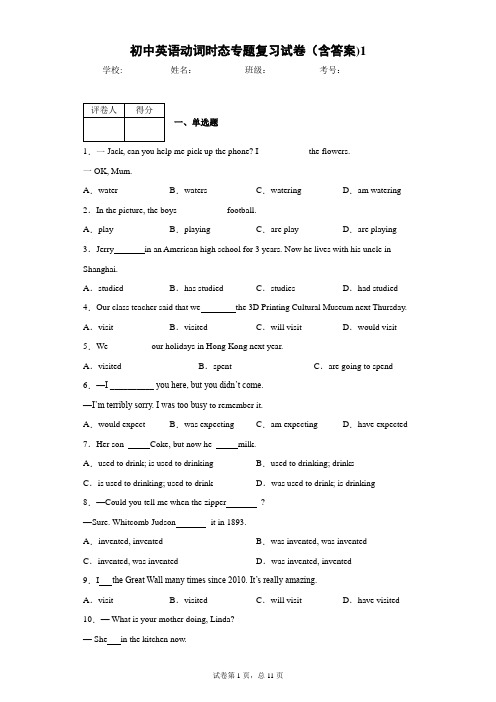
A.was talkingB.talkedC.am talkingD.talk
15.---you everthe new museum? --- No, I haven’t.
A.Do; visitB.Have; visitedC.Did, visitD.Are; visiting
A.traveledB.has traveledC.have traveledD.travels
28.Last week Lingling _________ a dress as a birthday present for her mom.
A.boughtB.buysC.has boughtD.was buying
39.Philip s___________her eyes and fell asleep soon.
40.Mr. Smith showed the boys how to behave p___________ like a gentleman at the dinner table.
根据句意及首字母或汉语提示完成单词
29.The spaceship _________ back some pictures since it reached Mars.
A.sendsB.has sentC.have sentD.sent
30.-What do you think of the movie The Wandering Earth?
32.Chinese people t___________their guests with a great meal.
33.Sally is such a careful girl that she s___________makes spelling mistakes.
初中英语时态综合复习讲练(含答案)
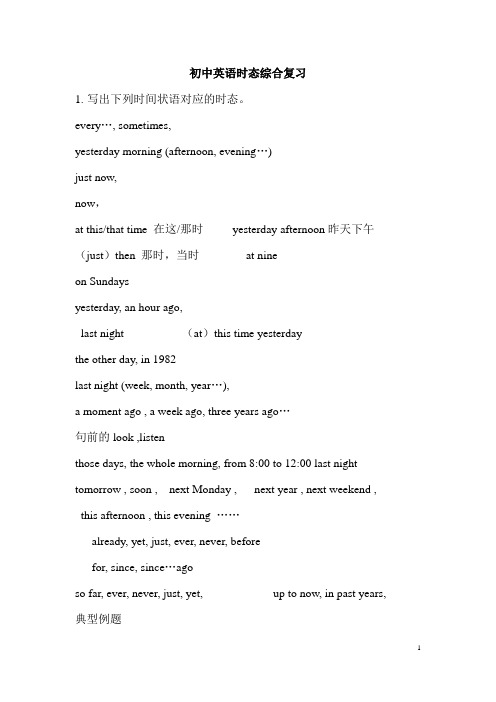
初中英语时态综合复习1.写出下列时间状语对应的时态。
every…, sometimes,yesterday morning (afternoon, evening…)just now,now,at this/that time 在这/那时yesterday afternoon昨天下午(just)then 那时,当时at nineon Sundaysyesterday, an hour ago,last night (at)this time yesterdaythe other day, in 1982last night (week, month, year…),a moment ago , a week ago, three years ago…句前的look ,listenthose days, the whole morning, from 8:00 to 12:00 last night tomorrow , soon ,next Monday , next year , next weekend , this afternoon , this evening ……already, yet, just, ever, never, beforefor, since, since…agoso far, ever, never, just, yet,up to now, in past years, 典型例题(1) ---Do you know our town at all?---No, this is the first time I ___ here.A. wasB. have beenC. cameD. am coming(1)He said he________me a present unless I_______ in doing the experiment.A. had not given; had not succeededB. would not give; succeedC. will not give; succeedD. would not give; will succeed. this morning, the whole morning, all day yesterday, from nine to ten last evening, when, whileMary ___ a dress when she cut her finger.A. madeB. is makingC. was makingD. makesAs she ___ the newspaper, Granny ___ asleep.A.read;was fallingB. was reading;fellC. was reading;was fallingD. read;fell---- Your phone number again? I ___ quite catch it.---- It's 69568442.A. didn'tB. couldn'tC. don'tD. can't巩固练习:(聪明的你一定能全部做对)1.2.3.4.5.(see)you at four yesterday afternoon?6., her son ____________ (play) outside the room.7.It ________ (begin) to we _____________(work) in the field.8.(go) out. {go out 意为熄灭}9.——------Oh, I ____________ (read) some books on science.10. Girls ___________(dance) boys ____________(sing) at the party.11.--- Did you see Tim just now?--- Yes. He __________ (fish) by the river.the teacher ______ (come) into the classroom, the students __________(laugh)loudly.写出下列时间状语对应的时态。
英语中考复习时态系列之
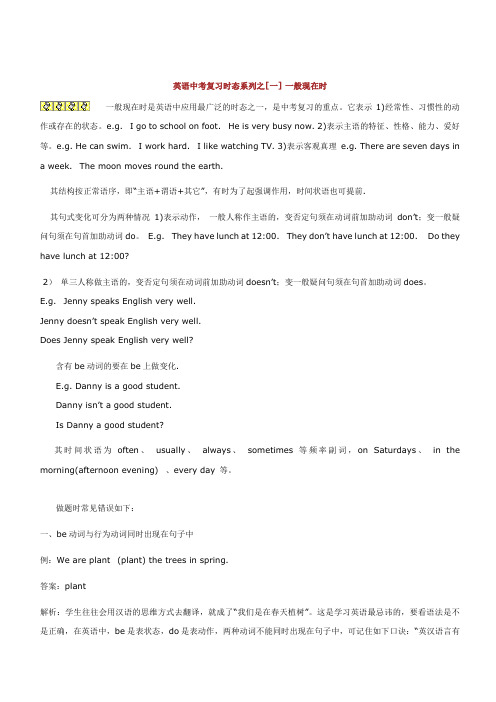
英语中考复习时态系列之[一] 一般现在时一般现在时是英语中应用最广泛的时态之一,是中考复习的重点。
它表示1)经常性、习惯性的动作或存在的状态。
e.g. I go to school on foot. He is very busy now. 2)表示主语的特征、性格、能力、爱好等。
e.g. He can swim. I work hard. I like watching TV. 3)表示客观真理 e.g. There are seven days in a week. The moon moves round the earth.其结构按正常语序,即―主语+谓语+其它‖,有时为了起强调作用,时间状语也可提前.其句式变化可分为两种情况1)表示动作,一般人称作主语的,变否定句须在动词前加助动词don’t;变一般疑问句须在句首加助动词do。
E.g. They have lunch at 12:00. They don’t have lunch at 12:00.Do they have lunch at 12:00?2)单三人称做主语的,变否定句须在动词前加助动词doesn’t;变一般疑问句须在句首加助动词does。
E.g. Jenny speaks English very well.Jenny doesn’t speak English very well.Does Jenny speak English very well?含有be动词的要在be上做变化.E.g. Danny is a good student.Danny isn’t a good student.Is Danny a good student?其时间状语为often、usually、always、sometimes等频率副词,on Saturdays、in the morning(afternoon evening) 、every day 等。
初中英语时态之一(一般过去时总结)
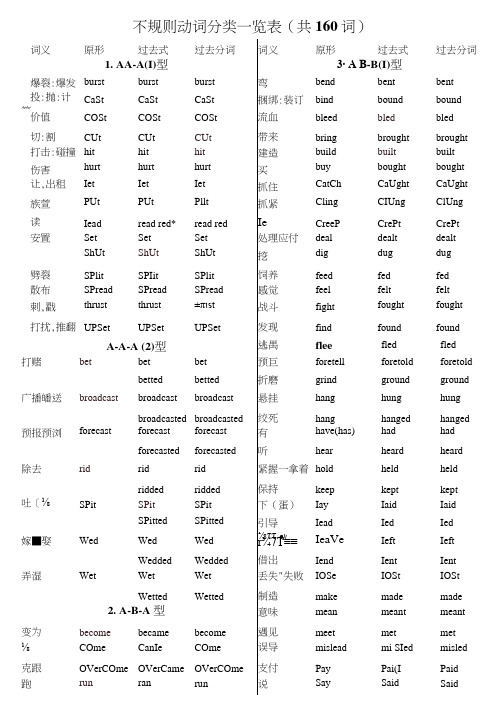
不规则动词分类一览表(共160词)词义原形过去式过去分词词义原形过去式过去分词1. AA-A(I)型3∙ A B-B(I)型爆裂:爆发burst burst burst 弯bend bent bent投:抛:计算CaSt CaSt CaSt 捆绑:装订bind bound bound价值COSt COSt COSt 流血bleed bled bled切:割CUt CUt CUt带来bring brought brought 打击:碰撞hit hit hit建造build built built伤害hurt hurt hurt 买buy bought bought 让,岀租Iet Iet Iet 抓住CatCh CaUght CaUght族萱PUt PUt Pllt 抓紧Cling CIUng ClUng读Iead read red* read red Ie CreeP CrePt CrePt安置Set Set Set 处理应付deal dealt dealt ShUt ShUt ShUt 挖dig dug dug劈裂SPlit SPIit SPlit 饲养feed fed fed散布SPread SPread SPread 感觉feel felt felt 刺,戳thrust thrust ±πιst战斗fight fought fought 打扰,推翻UPSet UPSet UPSet 发现find found foundA-A-A (2)型逃禺flee fled fled打赌bet bet bet 预巨foretell foretold foretoldbetted betted 折磨grind ground ground广播皤送broadcast broadcast broadcast 悬挂hang hung hungbroadcasted broadcasted 绞死hang hanged hanged 预报预浏forecast forecast forecast 有have(has) had hadforecasted forecasted 听hear heard heard 除去rid rid rid 紧握一拿着hold held heldridded ridded 保持keep kept kept吐[⅛SPit SPit SPit 下(蛋)Iay Iaid IaidSPitted SPitted 引导Iead Ied Ied嫁■娶Wed Wed Wed ⅛ττ ejιr¾7T≡≡IeaVe Ieft IeftWedded Wedded 借岀Iend Ient Ient 弄湿Wet Wet Wet 丢失"失败IOSe IOSt IOStWetted Wetted 制造make made made2. A-B-A 型意味mean meant meant变为become became become 遇见meet met met ⅛COme CanIe COme 误导mislead mi SIed misled克跟OVerCOme OVerCame OVerCOme 支付Pay Pai(I Paid 跑run ran run 说Say Said Said词义原形A-B 过去式B⑴型过去分词原形kneel过去式knelt过去分词knelt寻求SCek SOUght SOUght kneeled kneeled卖sell SOId Sold 斜靠Iean Ieant Ieant派it发送send Sent Sellt Ieaned Ieaned射ShOOt ShOt ShOt 跳Ie^ IeaPt IeaPt做Sit Sat Sat 1 eaped IeaPed睡sleep Sl ept SIePt 学习Iearn Ieamt Ieafnt度过,花费SPend SPeat SPent Ieamed learned纺纱SPin SPUn SPUn 点燃Hght Iit Iit站stand StOOd StOOd Iighted Iighted剌粘贴StiCk StUCk StUCk 证实PrOVe PrOVed PrOVed 打扫sweep SWePt SWePt PrOVen 摆动swing SWUng swung 照躍shine ShOIIe ShOne教teach taught taught 擦亮Shine Shined Shmed告诉tell told told(使滑行Slide SIid SIid想⅛ink thought thought 闻Smell SmeIt SnIelt懂明白UnderStand UnderStoOd UnderStOOd SmelIed SnlelIed支持IIPhOld UPheId UPheld 加快飞跑SPeed SPed SPed吳泣XVeeP WePt WePt SPeeded SPeeded 胜薦Win WolI WOn 拼写SPelI SPelt SPeIt收,撤WithhOId WhthheId WhthheId SPelIed SPelIed A-B B⑵型溢岀SPill SPilt SPiItBI awake awoke awoke SPilIed SPilledawaked awaked 扌贞坏SPOil SPOilt SPOiIt 祝福:保佑bless blest blest SPOiled SPOiledble ssed blessed 打敲罢工Strike StrUCk StnlCk 燃烧bum burnt burnt(adj.) StriCken burned burned 出汗SWeat SWeated SW eated 做梦±eam dreamt dreamt SWCat SWeatClreamed dreamed 膨胀SWell SWelled SWelled 港水diλr e dived dove (adj.) SWOlIen dove dove 鞭打WhiP WhiPt WhiPt忘记forget forgot forgot WhiPPed WhiPPedforgotten 包裹WraP WraPt WrqJt得到get got got WraPPed WraPPedgotten 绕:缠耳Vitld WOUnd WOUndWinded ^Inded词义原形4. A-]过去式B-C(I)型过去分词义樣词骑原形ride过去式rode过去分词ridden开始begin began begun 上升rise rose IiSen喝drink dr and drunk 揺动,霍动shake ShOOk Shaken(adj.) drunken 讲SPeak apoke SPOken铃响ring rang mng偷Steal StOIe StOlen唱Sing Sang Sllng 带走•拿take took taken下沉Sink Sank Silnk 从事Undertake UndeftOOk Undertaken(adj・)SlInken (唤瘗Wake WOke WOkell 弹,跳SPring SPrang SPnIng Waked WakedSPrUng SPnIng 编织WeaVe WOVe WOVell游泳,眼花SWim SWanl SWUm 写Write WrOte Written A-RC (2)A-B C (4)型吹blow blew blown生結果bear bore borne画,拉draw drew drawn born(adj.) 飞fly flew flown 发誓SWear SWOre SWonl 种,长grow grew grown 扯,撕tear tore torn知道know ICneW known 穿,戴Wear WOre WOrn推翻OVerthrOW OVerthreW OVerthrOWn A-BC (5)型投throw threw thrown 是在be(am. is.are) WaSΛ∖ere been收回:撤消V r ithdraW WithdreW Witfl drawn 做do(does) did ClOne A-RC (3)预见foresee foresaw foreseen 升起arise arose arisen 去go Went gone扒打败beat beat beaten 躺Iie Iay Iain扌丁破break broke broken(adj.) 撒谎Iie Iied Iied选择ChOOSe ChOSe ChOSen 锯SaW SaWed SaU r Il 驾:驱drive drove driven Sawed SaWed 吃eat ate eaten 看见See SaW Seen落支得⅛1fell fallen 缝SeW SeWed SeWTI 禁止forbid f Orbade fσrbi den SeWed SeWedf Orbad forbi dden 显示ShOW ShOWed shown 原谅forgive f OrgaVeg orgiven ShOWed ShOWed 冻结freeze froze frozen 播种SOW SOWed SOWn 给give gave given SOWed SOWed 躲藏hide hid hiddenhid hidden弄错:误解mistake mistook ni staken重写rewrite rewrote reλvritten一般过去时 (simple past tense) 表示过去某个时间里发生的非持续性动作或存在的状态,用动词的过去式表示,常和表示过去的时间状语连用,如:yesterday ,last night ,in 1990 ,two days ago,before,the age of 等。
(完整)初中英语语法时态专项练习
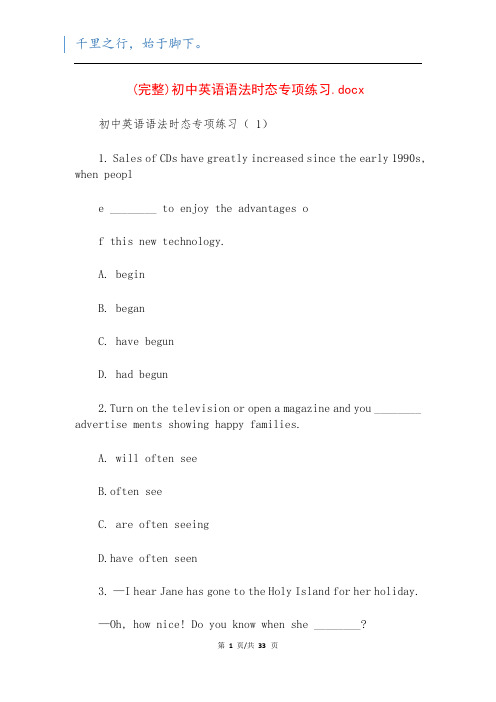
(完整)初中英语语法时态专项练习.docx初中英语语法时态专项练习( 1)1. Sales of CDs have greatly increased since the early 1990s, when people ________ to enjoy the advantages of this new technology.A. beginB. beganC. have begunD. had begun2.Turn on the television or open a magazine and you ________ advertise ments showing happy families.A. will often seeB.often seeC. are often seeingD.have often seen3. —I hear Jane has gone to the Holy Island for her holiday.—Oh, how nice! Do you know when she ________?A. was leavingB. had leftC. has leftD. left4. —What were you doing when Tony phoned you?—I had just finished my work and________ to take a shower.A. had startedB. startedC. have startedD. was starting5. I ________ you not to move my dictionary—now Ican’tfind it.A. askedB. askC. was askingD. had asked6. —Has Sam finished his homework today?—I have no idea. He ________ it this morning.A. didB. has doneC. was doingD. had done7. —What’sthat terrible noise?—The neighbors ________ for a party.A. have preparedB. are preparingC. prepareD. will prepare8. Now that she is out of a job, Lucy________ going back to school, b ut she hasn’decidedt yet.A. had consideredB. has been consideringC. consideredD. is going to consider9.The teacher, with 6 girls and 8 boys of her class,________ visiting a museum when the earthquake struck.A. wasB. wereC. had beenD. would be10. The discussion ________ alive when an interesting topic was brought in.A. was comingB. had comeC. has comeD. came11. Because the shop ________ , all the T-shirts are sold at half price.A. has closed downB. closed downC. is closing downD. had closed down12. Let ’skeep to the point or we ________ any decisions.A. will never reachB. have never reachedC. never reachD. never reached13. My mind wasn’ton what he was saying so I ’mafraid I ________ half of it.A. was missingB. had missedC. will missD. missed14.It is said in the book that Thomas Edison (1847—1931) ________ the world-leading inventor for sixty years.A. would beB. has beenC. had beenD. was15. — You were out when I dropped in at your house.—Oh, I ________ for a friend from England at the airport.A. was waitingB. had waitedC. am waitingD. has waited初中英语语法时态专项练习( 2)1. She has set a new record, that is, the sales of her latest book _______ _ 50 million.A. have reachedB. has reachedC. are reachingD. had reached2. He kept looking at her, wondering whether he ________ her somewher e.A. sawB. has seenC. seesD. had seen3.The crazy fans ________ patiently for two hours and they would wait till the movie star arrived.A. were waitingB. had been waitingC. had waitedD. would wait4.She ________ her hairstyle in her hometown before she came to Chon gqing for a better job.A. would changeB. has changedC. changedD. was changing5.The first use of atomic weapons was in 1945, and their power ________ increased enormously ever since.A. isB. wasC. has beenD. had been6. —You haven’saidt a word about my new coat, Brenda. Do you like it?—I’msorry I ________ anything about it sooner. I certainly think it’prestty on you.A. wasn’tsayingB. don’tsayC. won’t sayD. didn ’sayt7.All morning as she waited for the medical report from the doctor, her nervousness ________.A. has grownB. is growingC. grewD. had grown8.Why don’tyou put the meat in the fridge? It will ________ fresh for several days.A. be stayedB. stayC. be stayingD. have stayed9. How can you possibly miss the news? It ________ on TV all day lon g.A. has beenB. had beenC. wasD. will be10. - Sorry to have interrupted you. Please go on.-Where was I?-You ________ you didn ’liket your father ’jobs.A. had saidB. saidC. were sayingD. had been saying11. I arrived late; I ________ the road to be so icy.A. wouldn’texpectB. haven’expectedC. hadn’texpectedD. wasn’texpecting12.I ________ while reading the English textbook. Luckily, my roommate woke me up in time!A. had fallen asleepB. have fallen asleepC. fell asleepD. fall asleep13. Although he has lived with us for years, he _______ us much impres sion.A. hadn’t leftB. didn ’leavetC. doesn’leavetD. hasn’left14.I ________ ping-pong quite well, but I haven’thad time to play since the new year.A. will playB. have playedC. playedD. play15.I wonder why Jenny ________ us recently. We should have heard fro m her by now.A. hasn’writtenB. doesn’writeC. won’t writeD. hadn’written初中英语语法时态专项练习( 3)1.A short time before she ________ , the old lady ________a will, leav ing all her money to her brother.A. died; has writtenB. has died; wroteC. had died; wroteD. died; had written2. —Kate doesn’lookt very well. What’swrong with her?—She has a headache because she ________ too long; sheought to stop work.A. has been readingB. had readC. is readingD. was reading3. As time ________ on, Sally began to wonder if Bruce ________ Bilks ’new poem called Tabled ’ Hute.A. has gone; had readB. went; has readC. goes; has readD. went; had read4. —Mike, do you know who wanted me on the phone?—Sorry. I don’tknow. I ________ a bath in the bathroom.A. have hadB. was havingC. hadD. am having5. —Could you tell me how your father usually goes to work?—Yes. If it is fine, he ________ to his office.A. will walkB. will go on footC. walksD. would goon foot6. —I called you at ten, but there was no reply.—Oh, that was probably when I ________ a shower.A. am takingB. tookC. were to takeD. was taking7. —Have you ever worked with a tape recorder?—I ________ it a lot when I was studying French in school.A. usedB. was usedC. have usedD. had used8. —You must have met him the other day. — Oh, no, I________ .A. hadn’tB. mustn’tC. haven’tD. didn ’t9. —Which flight________ ? —I want to catch the 13:00.A. you are to catchB. are you catchingC. do you catchD. have you caught10. — Excuse me, sir. Would you do me a favor?—Of course. What is it?—I________ if you could tell me how to fill out this form.A.had wonderedB. was wonderingC. would wonderD. did wonder11.How can I ever concentrate (集中精力 ) if you ________ continually _ _______ me with silly questions?A. have?interruptedB. had interruptedC. are ?interruptingD. were?interrupting12. — I bought this shirt for 35 yuan yesterday.—It ’ons sale today for only 29. You should have waited.—Oh, really? But how ________ I know?A. wouldB. canC. didD. do13. — Will you go now?—Not until I ________ my experiments.A. will finishB. have finishedC. will have finishedD. had finished14. — Look! Someone has spilt coffee on the carpet.—Well, it ________ me.A. isn ’tB. hasn’beentC. hadn’tbeenD. wasn’t15. — Did you enjoy your holiday?—Yes, it ’thes best holiday I ________ these years.A. hadB. have hadC. had hadD. would have初中英语语法时态专项练习( 4)1.I don’ understand how you got a ticket. I always ________ you ________ a careful driver.A. think; areB. am thinking; areC. thought; wereD. think; were2.I really ought to go on a diet。
初中英语动词时态归纳总结对照表(1)
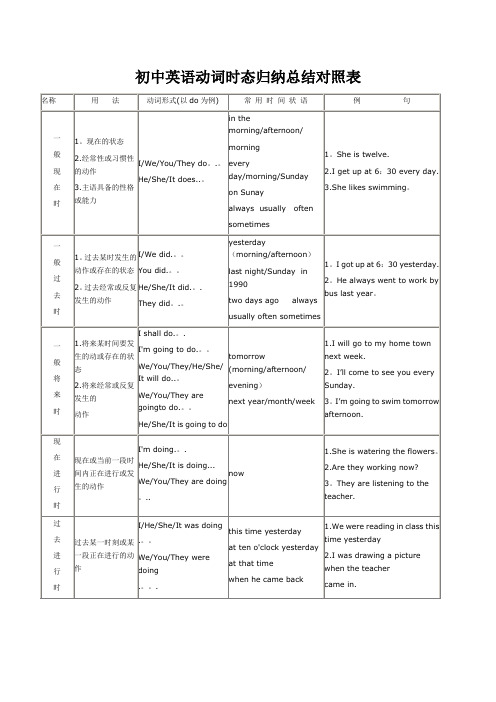
初中英语动词时态归纳总结对照表初中英语时态专项练习1、一般现在时。
通常用“usually, often, every day,sometimes”。
一般现在时基本用法介绍一、一般现在时的功能1.表示事物或人物的特征、状态.如:The sky is blue。
天空是蓝色的。
2.表示经常性或习惯性的动作。
如:I get up at six every day。
我每天六点起床。
3.表示客观现实。
如:The earth goes around the sun.地球绕着太阳转。
二、一般现在时的构成:肯定句:1)。
主语+系动词 be(is, am, are )+名词(形容词,介词短语)2) 。
其他主语+动词原形+其它第三人称单数+动词—s+其它如:I am a boy.我是一个男孩。
We study English。
我们学习英语。
Mary likes Chinese。
玛丽喜欢汉语.三、一般现在时的变化否定句:1)主语+ be (is,am,are)+ not +其它。
如:He is not a worker。
他不是工人.2)其他主语+do not(don’t)动词原形+其它I don't like bread第三人称单数+does not(doesn’t)动词原形+其它He doesn’t often play。
一般疑问句:1)Be(Is,Are) +主语+其它?如:-Are you a student?—Yes。
I am。
/ No, I'm not.2)Do其他主语+动词原形+其它?Does+第三人称单数+动词原形+其它+?注意:遇I/we-you, my—your, some—any。
Does she go to work by bike?- Yes, she does。
/ No, she doesn’t。
Do you often play football?- Yes, I do。
初中英语动词时态总复习(超级精华版)

2. 过去将来时的用法 : 1)表示从过去某时看将要发生的动作或存在的状态。常用于主句是一般过去时的宾语从句中。 例如:He said that he would finish his work before 9 o’clock. 他说他会在九点之前完成工作。 2)“was/were going to+动词原形”所表示的过去将来时,表示过去曾经打算或将要做某事。 例如:She said she was going to buy a car. 她说她打算买一辆小汽车。
01
02
1.改为一般疑问句并回答。
Yes, I will./No, I won't. I won't do my homework tonight.
I will do my homework tonight. Will you do your homework tonight?
2.改为否定句。
句型转换
表示在过去,经常或反复发生的动作。常与often,always等表示频度的副词连用。
01
例如:
02
When I was a child, I often played football in the street.
03
我是个孩子的时候,常在马路上踢足球。
04
例如:Did you see him today?
1.改为一般疑问句并回答。
01
句型转换
1.改为一般疑问句并回答。
2.改为否定句。
Jim does his homework every day. Does Jim do his homework every day?
Yes, he does./No, he doesn't. Jim doesn't do his homework every day.
初中英语时态练习100题(附答案)
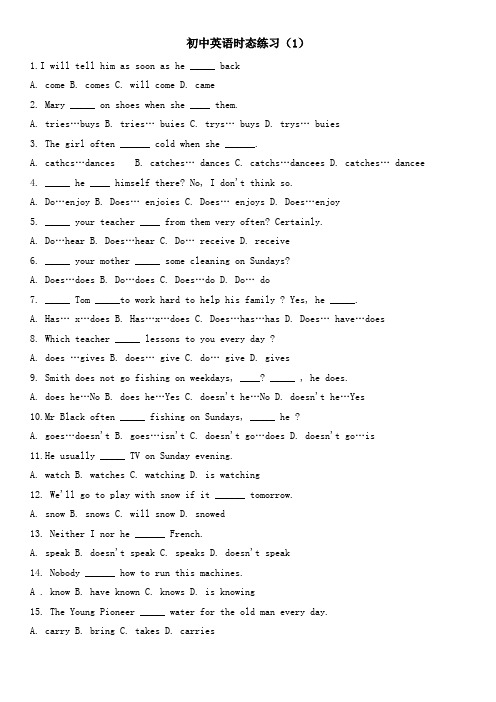
初中英语时态练习(1)1.I will tell him as soon as he _____ backA. comeB. comesC. will comeD. came2. Mary _____ on shoes when she ____ them.A. tries…buysB. tries… buiesC. trys… buysD. trys… buies3. The girl often ______ cold when she ______.A. cathcs…danc esB. catches… dancesC. catchs…danceesD. catches… dancee4. _____ he ____ himself there? No, I don't think so.A. Do…enjoyB. Does… enjoiesC. Does… enjoysD. Does…enjoy5. _____ your teacher ____ from them very often? Certainly.A. Do…hearB. Does…hearC. Do… receiveD. receive6. _____ your mother _____ some cleaning on Sundays?A. Does…doesB. Do…doesC. Does…doD. Do… do7. _____ Tom _____to work hard to help his family ? Yes, he _____.A. Has… x…doesB. Has…x…doesC. Does…has…hasD. Does… have…does8. Which teacher _____ lessons to you every day ?A. does …givesB. does… giveC. do… giveD. gives9. Smith does not go fishing on weekdays, ____? _____ , he does.A. does he…NoB. does he…YesC. doesn't he…NoD. doesn't he…Yes10.Mr Black often _____ fishing on Sundays, _____ he ?A. goes…doesn'tB. goes…isn'tC. doesn't go…doesD. doesn't go…is11.He usually _____ TV on Sunday evening.A. watchB. watchesC. watchingD. is watching12. We'll go to play with snow if it ______ tomorrow.A. snowB. snowsC. will snowD. snowed13. Neither I nor he ______ French.A. speakB. doesn't speakC. speaksD. doesn't speak14. Nobody ______ how to run this machines.A . know B. have known C. knows D. is knowing15. The Young Pioneer _____ water for the old man every day.A. carryB. bringC. takesD. carries16. Some are ______ in the river and some are ______ games.A. swimming… playingB. swimming…plaiingC. swimming… I playingD. swimming…plaing17. Look ! The boy students are _____ football while the girls are _____ .A. playing… danceB. playing… dancingC. play… dancingD. play… dance18. He _____ to do his lessons at eight every evening.A. is beginningB. is beginningC. beginD. begins19. _____ he _____ on well with his friends this term ?A. Does…getsB. Does…getC. Is…gettingD. Is…geting20. Mr Smith _____ short stories, but he ____ a TV play these days.A. is writing…is writingB. is writing… writesC. writes… is writingD. writes… writes 参考答案:1—5 BABDB 6—10 CDDBA 11—15 BBCCD 16—20 CBDCC初中英语时态练习(2)21. I _____ to the cinema. I ______ there every Sunday.A. go…goB. am going… goC. go… am goingD. am going…am going22. Look, they______ a good time, ____ they ?A. have…doB. have…don'tC. are having…areD. are having… aren't23. You ______ about the future now, ______ you ?A. don't think…don'tB. aren't thinking… aren'tC. don't think… doD. aren't thinking… are24. She always ______ something whenever she ______.A .s tudied…played B. studied…plaiedC.. studied…plaiedD. studied… played25. He often _____ late in the forest. It _____ me very much.,A. stayed…worriedB. staied… worriedC. stayed…worryedD. staied… worried26. I ______that the boy _____ with no tears in his eyes.A. noticed… cryedB. noticed… criedC. noticed…criedD. noticed… cryed27. We _____the floor and _____ all the windows.A. mopped… cleannedB. moped… cleanedC. mopped…cleanedD. moped… cleaned28. When I _____ the Children's Palace, the children _____ with joy.A. visited… jumppedB. visited… jumpedC. visited… jumpedD. visited… jumpped29. ______ a sports meet last Sunday ? Yes , they ______.A. Did they have… didB. Did they have… hadC. Had they... had D. Had they (i)30. ____ you _____out for a walk after supper ? Yes, I ______.A. Did…went…wentB. Did… go… wentC. Did... went... did D. Did... go (i)31. _____ Jack _____ on with his work or ______ to have a rest?A. Did… went… stoppedB. Did… go… stopC. Did… went… stopD. Did… go… stopped32. You gave them a talk two days ago, _____you ? Yes, I ______.A. did… didB. did… gaveC. didn't… didD. didn't… gave33. ____ your brother _____ a letter to ? My father.A. Who… wroteB. What…wroteC. Who did…writeD. What did… write34. They _____ about the TV news then in the sitting-room. They often ____ such talksA. talked…hadB. talk…haveC. were talking…hadD. are talking…have35. He ______ some cooking at that time, so _____ me.A. did… heardB. did… didn't hearC. was doing… heardD. was doing… didn't hear36. " _____ you angry then?" "They_ too much noise.”A. Are…were makingB. Were…were makingC. Are…madeD. Were… made37. This time yesterday Jack _____ his, bike. He _____ TV.A. repaired… didn't watchB. was repairing… watchedC. repa ired… watchedD. was repairing… wasn't watching38. We _____ for Tom at ten last Sunday. He often kept us ______.A. were waiting… waitingB. were waiting… waitC. waited… waitingD. waited… wait39. When you _____ at the door, I _____ some washing.A. k nocked… didB. was knocking… didC. knocked… was doingD. knock… am doing40. The boy_____ English on the radio when I _____ his door.A. learned… was openingB. was learning… openedC. learned… openedD. is learning… open参考答案:21-25 BDDDA 26—30 BCBAD 31—35 BCCCD 36—40 BDACB初中英语时态练习(3)41. When they______ through the forest, a bear _____ at them.A. walked… was comingB. were walking… cameC. were talking… comesD. walk… is coming42. A young man _____ her while she _____ her work .A. watched… was finishingB. was watching… finishedC. watched… finishedD. was watching… was finishing43. While mother _____ some washing, I ______ a kite for Kack.A. did… madeB. was doing… madeC. was doing… was makingD. did… was ma king44. I _____ myself French from 7 to 9 yesterday morning. I _____ to work.A. was teaching… didn't goB. taught… didn't goC. was teaching… wentD. taught… went45. He _____ a model plane when I came to see him.A. makesB. is makingC. was makingD. made46. I ______ a letter at nine last night.A. is writingB. was writingC. wroteD. is writing47. The teacher_____ (give) us a history lesson when Tom walked into the classroom.A. gaveB. is givingC. was givenD. was giving48. There will be a football match in two days, that is _______.A. last SundayB. next SundayC. every SundayD. this Sunday49. We ______ class meeting this November.A. hadB. haveC. will haveD. are having50. He ______ in his garden every morning next year.A. will workB. worksC. workedD. is working51. Be careful. The train ______.A. will comeB.C. comesD. is coming52. Look at those clouds. It _____ soon, I'm afraid.A. is going to rainB. is rainingC. will rainD. won't rain53. The radio says it ______ the day after tomorrow.A. is going to snowB. is snowingC. will snowD. snows54. _____ he _____ some shopping tomorrow afternoon ?A. Will…doesB. is going to doC. is…doingD. Shall… do55. What day _____ it ______ tomorrow ? Wednesday.A. is… going to beB. will…beC. shall…beD. does…be56. The boy _______ sixteen years old next year.A. is going to beB. is growing to beC. will beD. is57. _____ you ____ me up at six, please ?A. Are…going to wakeB. Are…wakingC. Will…wakeD. Do…wake58. If he ______ to college, he _____ a lot more.A. will go…will learnB. will go…is going to learnC. is going… is going to learnD. goes… will learn59. When she _____ next time ,l ______ her everything.A. is going to come…shall tellB. will come…shall tellC. comes…will tellD. come…will tell60. What day ____ it ____ tomorrow ? It ____Tuesday.A. is…going to be… isB. will…be…willC. is…going to be…is goingD. will be…will be参考答案:41-45 BDCAC 46—50 BDDCA 51—55 DACBB 56—60 CCDCD初中英语时态练习(4)61. She _____that she _____ her best to help them the next term.A. says…will doB. said…will doC. said… would doD. says…would do62. People _____ that the Smiths _____ for a holiday next week.A. say… will goB. said… will goC. said… would goD. say…would go63. Nobody _____ us that he _____ even stricter with usA. tell…will beB. tells…would beC. told…will beD. told…would be64. Please _____ him that we _____ able to help him.A. tell…will beB. tells… would beC. told…will beD. told… would be65. Jack _____ that they _____ surprised to see it this Friday.A. know… would beB. knows… will beC. knew… would beD. knew… will be66. I _____to know if Mary_____ by train that afternoon.A. want… would goB. want… will goC. wanted… would goD. wanted… will go67. _____ he _____ that they _____ home tomorrow?A. Does… learn… would goB. Does… learn… will goC. Did… learn… would goD. Did… learn… will go68. We _____ that they _____ a sports meet tomorrow.A. learn… would haveB. have learned… would haveC. learn… will haveD. have learned… will have69. ____ you _____ that he _____ his lost son one day ?A. Do…think…will findB. Do…thought…would findC. Did…think…will findD. Did…thought…would find70. I _____ that you _____ good care of her that day.A. thought…will takeB. thought…would takeC. think… will take B. think… would take71. The visitors _____ where they _____ a short test.A. ask… would takeB. ask… will takeC. asked… would takeD. asked… can take72. John ____ sure that he ____ good at chemistry soon.A. be… will beB. is, would beC. was… will beD. was… would be73. She ____ ill so she ____ able to go skating the next day.A. is… won't beB. is… wouldn't beC. was… won' beD. was… wouldn't be74. He _____ the thief to the police when he _____ the man again.A. would take… would meetB. would take…metC. will take… will meetD. will take… meet75. Mother ____ me a new coat yesterday, I _____ it on. It fits me well.A. has made…have triedB. made…have triedC. has made…triedD. made…tried76. " He ____ to draw horses already ."" When ____he ?”. " Last year. "A. learned...has B. learned...did C. has learned...has D. has learned (i)77. Tom ____ up into the tree. Look, he _____ high up there !A. has got… isB. has climbed… wasC. got… wasD. climbed… is78. _____you _____ the text yet ? Yes, we _____ it two hours ago.A. Did…copy…didB. Have… copied…haveC. Have… copied… didD. Did …copy…had79. "Why she angry?" "Because he _____ at he just now.A. did… get, shoutedB. has…got…shoutedC. did… get… has shoutedD. has…got…has shouted80. _____ you ______ the film before ? Where ____ you _____ it ?A. Have… seen… did… seeB. Did…see…die…watchC. Have…seen… have… seenD. Did…see…have…seen参考答案:61-65 CADAB 66—70 CBDAB 71—75 CDDBB 76—80 DACBA初中英语时态练习(5)81. You _____ me waiting for two hours. I _____ for you since five.A. Kept…waitedB. have kept…waitedC. kept…have waitedD. have kept…have waite d82. Where _____John _____? To the library. He _____ there for an hour.A. has… been … has goneB. has…gone…has beenC. did… go… wentD. did…be…went83. _____ the baby still _____ ? No, it ______ crying.A. Has… cried… has stoppedB. Is…crying…stoppedC. Did… cry… stoppedD. Is…crying…has stopped84. I _____ the way. I ______ here for quite many years.A. knew... have lived B. knew (iv)C. know... have lived D. know (iv)85. _____ you ever _____America ? Yes, I have.A. Have… gone toB. Have… gone inC. Have… been toD. Have… been in86. My brother _______ college for over three years.A. has gone toB. has been toC. has been inD. has been for87. He _____ the Army by the end of 1992. He ____ in the army since then.A. joined…isB. has joined…has beenC. had joined…isD. has joined… has been88. By the time I _____ back they ____ up ten metres.A. came…have climbedB. came…had climbedC. come…have climbedD. had come…climbed89. Jack ____ over five lessons by seven o'clock. Then he____ a test.A. went…tookB. went…had takenC. had gone…tookD. had gone…had taken90. We _____ out by that time that he ____ a thief for a long time.A. had found…had beenB. had found…wasC. found…had beenD. found…was91. Before the new _____ him, he ____ to know about it.A. reaches… has gotB. reached…had gotC. reached… gotD. had reached…got92. I _____ him a second letter before I _____ from him.A. wrote… heardB. wrote… had heardC. had written… heardD. have written… hear93. We _____ in a good harvest because we ______ enough rain.A. didn't get… had hadB. got… had hadC. had got… had badD. got… hadn't had94. They ____for five hours when they ____ in New York.A. flew…arrivedB. had flown…had arrivedC. flew…had arrivedD. had flown…arrived95. She ____ that ____ it for two days by that day.A. says…has rainedB. says…had rainedC. said… had rainedD. said…rained96. John _____ there since the year before, so he ____ them.A. had worked…knewB. had worked….had knownC. worked…knewD. worked…had known'97. He _____ angry because he _____ for a long time.A. had got…had waitedB. got…waitedC. had got…waitedD. got…had waited98. Paper _____ first invented in China.A. isB. areC. wasD. were99. The Greens _____ China for five years.A. has been inB. have been inC. went toD. has gone to100.There _____ an eraser under the desk. Is it yours ?A. isB. hasC. wasD. had参考答案:81-85 DBDCC 86—90 DDBCA 91—95 BCBDC 96-100 ADCBA。
初中英语动词时态附答案附答案(1)

一、选择题1.The real reason why prices ________, and still are, too high is hard to understand, and no one can explain this problem.A.were B.would be C.have been D.will be 2.—Have you finished writing your book?—Yes, it ________ already and ________ soon.A.is printed; will come out B.has been printed; will be come outC.has been printed; will come out D.is printed; will be come out3.My parents in Hong Kong. They were born there and have never lived anywhere else. A.live B.livedC.were living D.will live4.The project they are working on ________ many teenager problems that they care about. A.covering B.covers C.include D.including5.—I want to know if he ________ back tomorrow.—I’ll call you as soon as ________.A.will come; will return B.will come; returnsC.comes; will return D.come; returns6.It seldom snows in winter here,_______?A.does it B.doesn’t it C.do it D.don’t it7.- Work hard, Tom. And if you , you’ll succeed. - OK. I will.A.are B.do C.have D.will8.— How much are the two pairs of trousers?— They are not expensive. I think one hundred dollars ______ enough.A.is B.are C.were D.was9.This kink of milk________ well . It________ out soon.A.is sold, sells B.sells; is sold C.is sold, will be sold D.sells, will be sold 10.—How much are the two pairs of shoes?—They are not expensive. I think fifty dollars ______ enough.A.is B.are C.were D.was11.— Where have you been these days?—I’ve just come back from Canada. I ________ there for three weeks.A.have stayed B.stayed C.stay D.will stay12.The Small Goose Pagoda in Xi’an, one of the 22 Silk Road relics located in China, _______ back in 707 during the Tang Dynasty.A.dated B.was datedC.dates D.is dating13.—Have you ever been to Shanghai?—Of course. Actually, I ________ there for six years but now I live in Zhenjiang.A.worked B.was working C.would work D.have worked 14.We live in a beautiful cottage with a yard, which ______ 20 feet from side to side. A.measures B.is measuredC.measured D.has been measured15.Jenny who I ________ to know in Australia has worked in China for a year already. We are going to meet next week.A.has got B.will get C.got D.get16.—I know Lisa is your best friend. Do you see much of each other now?—No! She ________ in New York for ten years, but now she lives in Los Angeles.A.lives B.has lived C.lived D.is living17.— Have you heard of Yangzhou Horticultural Expo? It is showing gardens around the world.— Yes. I ________ it with my parents the other day.A.visit B.visited C.will visit D.have visited 18.— Where have you been these days?—I’ve just come back from Canada. I there for three weeks.A.have stayed B.will stay C.stay D.stayed 19.—Have you ever been to Beijing?—Yes. In fact, I ________there for three years but now I work in Suzhou.A.have studied B.studied C.would study. D.was studying 20.—I don't care ________. In this army, there's only one hairstyle—short! Understand?—Yes, sir!A.what you are used to liking B.what you used to be likeC.what are you used to liking D.what did you use to be like21.—I really enjoy the shows in the programme Online Travel in China.—Me too. More online shows about Chinese culture________soon.A.will open B.have opened C.is opening D.open22.—Is there anything wrong with your mobile phone?— Yes, I hope you _________.A.to repair B.to have it repaired C.have repaired it D.will have it repaired 23.The newspaper has picked out some events that mattered to the world last year and________ our world for years to come.A.influence B.influenced C.will influence D.have influenced 24.—Jenny, you look busy recently.—I’m practising running these days. I the Nanjing Marathon this autumn.A.was taking part in B.has taken part inC.took part in D.will take part in25.—I wonder what makes you a successful manager.—I ________ as a waiter for five years and it makes a lot of contributions to my today’s work. A.serve B.have served C.was serving D.served26.Some believe that China faces similar problems as devices meant to fight crime _______ to invade privacy.A.beginning B.begun C.begin D.had begun27.The fact that so many people still smoke in public places____ that we may need a nationwide campaign to raise awareness of the risks of smoking.A.suggest B.suggests C.suggested D.suggesting 28.Our society would be better off but for the fact that the economy ________ by the current global financial crisis.A.had been affected B.were affectedC.should be affected D.is affected29.— Do you know if Cindy will drive to Italy this weekend?— Cindy? Never! She ______ driving.A.has hated B.hatedC.will hate D.hates30.The father as well as his three children _____________ skating on the frozen river every Sunday afternoon in winter.A.is going B.goC.goes D.are going31.He will have learned the guitar for eight years by the time he ________ from the university next year.A.will graduate B.graduatesC.will have graduated D.is to graduate32.—I pressed the button just now, but no copies came out.—The machine _______ well. You must have made an error in operation.A.runs B.ranC.had run D.has run33.The school in library my mother works in the east of the village.A.whose;lies B.which;lay C.which;lies D.which;lying 34.Do you know what time _________?A.the train leave B.does the train leaveC.will the train leave D.the train leaves35.The classroom ________ by students every day.A.cleans B.cleanedC.is cleaned D.is cleaning36.She told me the sun ______ in the east.A.rise B.roseC.rises D.had risen37.Mr. Black, as well as the professor who________ from Beijing University, ________ to attend our school meeting.A.come; is B.comes; are C.comes; is D.come; are38.The Spring Festival is the time of year that _____ the largest annual mass migration on the planet when one sixth of t he world’s population _____ home.A.will see; travels B.saw; was travellingC.will be seeing; will be travelling D.sees; travel39.Theoretically, a good screwdriver should last a lifetime, but it rarely___________, usually because it is used at one time or another as ___________ some other tool.A.should, a favor for B.should, a lack ofC.does, a way of D.does, a substitute for40.Attention, please. The last plane to London ___________ off at 9: 00 pm.A.take B.takesC.took D.has taken41.—Have you got any news of the exam results?—No, but I’ll contact you as soon as I them.A.am getting B.gotC.will get D.have got42.Still many Senior Three students haven't realized reading English newspapers _______of great help to their English study.A.is B.are C.have been D.had heen 43.The teacher told us that light ________ faster than sound.A.travelled B.has travelledC.travels D.was travelling44.He’s been informed that he ________ for the scholarship because of his academic background.A.hasn’t q ualified B.hadn’t qualifiedC.doesn’t qualify D.wasn’t qualifying45.A long road tests a horse’s strength and a long-term task ________ a man’s heart. A.proves B.will prove C.is proving D.has proved 46.Every time he ______ to visit me, he ______ buy me some books.A.will come; will B.will come; wouldC.comes; will D.comes; would47.That’s why I help brighten people’s days. If you ________, who’s to say that another person will?A.didn’t B.don’tC.weren’t D.haven’t48.Our class _______ forty-five students, in other words, forty-five students ______ our class. A.consists of, are made up of.B.is consisted of, make up.C.consists of, make up.D.is consisted of, are made up of.49.The Dragon Boat Festival ________ the beginning of the hottest season of the year.A.is marking B.marks C.will mark D.marked50.Our bedroom ________ 8 metres across, if ________ in metres.A.is measured; measured B.is measured in; measuring C.measures; measured D.measures in; measuring【参考答案】***试卷处理标记,请不要删除一、选择题1.A【详解】句意:价格过去过高,现在仍然过高的真正原因很难理解,也没有人能解释这个问题。
